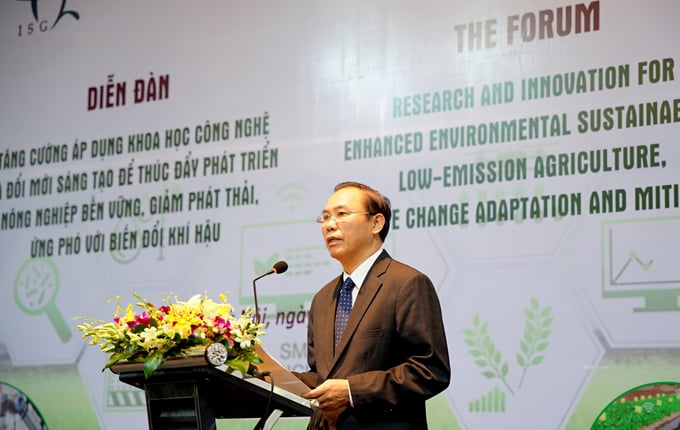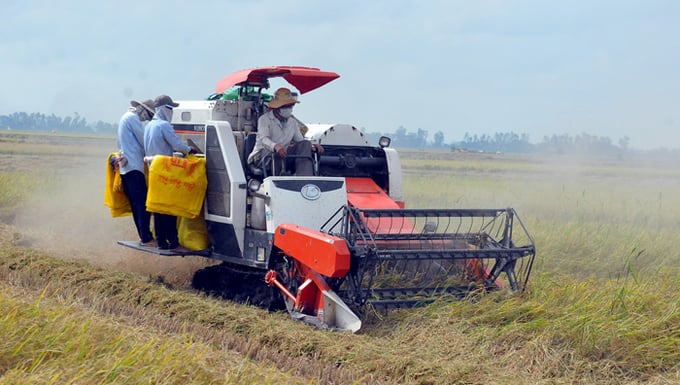November 18, 2025 | 23:37 GMT +7
November 18, 2025 | 23:37 GMT +7
Hotline: 0913.378.918
November 18, 2025 | 23:37 GMT +7
Hotline: 0913.378.918
The forum entitled "Research and innovation for enhanced environmental sustainability, low-emission agriculture, climate change adaptation, and mitigation" was conducted on November 28 in Hanoi.
MARD and the Consultative Group on International Agricultural Research (CGIAR) organized the event online and offline.
During his address at the event, Deputy Minister of Agriculture and Rural Development Phung Duc Tien stated that despite Vietnam's agriculture's rapid expansion and progress, it faces several obstacles, including drought, saltwater intrusion, and other uncertainties. To transform challenges into opportunities, the agricultural sector has developed numerous orientations, strategies, policies, and solutions to maintain its position as the backbone of the economy, where science and technology development as well as innovation are always regarded as the spearhead and key to success for the foundation of agricultural development, building new rural communities in the direction of ecological agriculture, modern agriculture, and smart agriculture.
At the 13th National Party Congress in 2021, the Party reiterated its determination to promote science, technology, and innovation vigorously in order to achieve a breakthrough in the Fourth Industrial Revolution output, production quality, and competitiveness. Regarding agriculture, Congress mentioned the promotion and restructuring of agriculture, the development of concentrated and large-scale commodity agriculture, the modernization of specialized farming areas, high-quality commodities, and the strong development of high-tech agriculture, organic agriculture, ecological agriculture, etc.
Vietnam has engaged in agricultural growth in recent years, using science and technology to numerous models such as seed production, farming a variety of high-yield and high-quality goods, organic products, etc., which has produced evident results.
Leaders of the Ministry of Agriculture and Rural Development have stated that Vietnam's agriculture is transitioning from "brown" to "green" in a very positive manner, as organic fertilizers have decreased to 3 million tons, biological plant protection drugs have reached approximately 15%, and the raw material area has constructed material models with public and transparent information so that all stages of agricultural production can see the criteria for food safety.

Deputy Minister of MARD Phung Duc Tien delivered at the forum entitled "Research and innovation for enhanced environmental sustainability, low-emission agriculture, climate change adaptation, and mitigation" which was conducted on November 28 in Hanoi.
Science and technology contribute more than 30% to the added value of the agricultural industry and more than 38% to the creation of plants and livestock. Science and technology have improved agricultural goods' production, quality, and competitiveness in the local and international markets, helping to place Vietnam among the world's leading exporters of industries such as pepper, rubber, and cashew...
"Science and technology not only improve the lives of farmers by boosting agricultural production's productivity, quality, and value but also drastically alter the rural landscape of Vietnam. According to Deputy Minister Phung Duc Tien, science, technology, and innovation are essential for the agriculture industry to respond to climate change.
Michael Akester, WorldFish's Regional Director for Southeast Asia and the Pacific, stated that geopolitical events have created significant barriers to agricultural innovation and the use of science and technology.
Vietnam is one of the countries with the most impressive achievements in the application of science and technology in agriculture, including the use of pesticides and biological and organic fertilizers to improve biosecurity and agricultural product quality. To secure food security, reduce greenhouse gas emissions, and promote the circular economy, we discuss the use of cleaner, greener, and more sustainable energy sources.
In his speech introducing the policies and priorities of the Vietnamese agricultural sector, Mr. Tran Cong Thang, Director of the Institute of Policy and Strategy for Agriculture and Rural Development (IPSARD), stated that the contribution of science and technology to agricultural growth is still limited.

Science and technology contribute more than 30% to the added value of the agricultural industry and more than 38% to the creation of plants and livestock.
He cited an FAO study on the contribution of science and technology to agricultural growth as measured by Total Factor Productivity (TFP) to demonstrate that despite the region's average rate of contribution compared to other nations, the potential for the application of science and technology in agriculture is enormous.
Additionally, Deputy Minister Phung Duc Tien highlighted several limits of the agricultural use of science and technology. The agricultural industry must admit that the scale of science and technology application is still modest; the products and output of science and technology applied to agricultural production are still modest and do not meet the requirements of agricultural development in our nation. The amount of science and technology applied to agricultural production is still inadequate, and the process of bringing science and technology to agricultural production has not resulted in high socioeconomic efficiency or sustainability.
Translated by Linh Linh

(VAN) Deputy Prime Minister Tran Hong Ha convened a meeting with the MAE and relevant agencies to discuss the draft decree on national multidimensional poverty standards for the 2026 - 2030 period.

(VAN) The year 2025 marks the 10th anniversary since more than 190 countries adopted the Paris Agreement on climate change, paving the way for strengthened global action.

(VAN) The PepsiCo Foundation funded the project ‘New Harvest: Sustainable Agriculture Initiative’, focusing on regenerative agriculture and climate change.

(VAN) Dr. Nguyen Viet Hung, ILRI's Regional Director for Asia, emphasized the One Health approach in ensuring food safety and reducing antimicrobial resistance risks in livestock.

(VAN) The youth-driven initiative ‘Innovate for water, act for the future’ seeks practical, scalable solutions to Vietnam’s water challenges.

(VAN) At the Annual Science Conference of Thuyloi University, Deputy Minister Phung Duc Tien directed researchers to focus on in-depth studies, data harmonization, and solutions linked to real-world practice.

(VAN) After nearly four years of implementation, 5,187 community agricultural extension groups have been established nationwide, with 47,493 members participating.